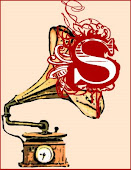The album is 1982's World Music pioneer release from King Sunny Adé And His African Beats and it is called Ju Ju Music.

OK, there had been African musicians in the western eye before; Fela Kuti, Hugh Masekela, Miriam Makebo, Manu Dibango etc, but this was a new departure for Island Records.
Chris Blackwell had set up Mango, a World Music offshoot of Island and needed someone to make a big splash. Since the death of Bob Marley in 1981, Blackwell had been looking for a new Third World musician to turn into a superstar and King Sunny Adé had been brought to his attention by producer and African music expert Martin Meissonnier.
King Sunny Adé wasn't exactly unknown in Nigeria, where he was a huge star, but in the West, African music was pretty much a niche thing in the early 1980s. The release of Ju Ju Music changed that for ever. It was his first international release on a major label and it proved to be a success both with the critics and also with the record buying public.
Meissonnier realised that the Nigerian style of music, basically long jams, wouldn't necessarily work with western audiences and he persuaded Adé to chop up his long pieces into discrete tracks.
The music itself was a revelation to western music fans. It was a sophisticated blend of traditional percussion and chants with electric guitars, keyboards, pedal steel and synthesisers. Soundwise, we have a jazzy feel in places, talking drums blending with electric guitars, spacey grooves, dance beats and a lot of jamming and even some Jamaican style Dub echo.
The relationship with Island didn't last. King Sunny Adé was reluctant to let Island meddle with his sound and push him in a commercial (i.e. commercial to western ears) direction.
This album is still a landmark though. Following on from King Sunny Adé other artists would find success in the West; Salif Keita, Mory Kanté (his Yé ké yé ké was a huge Summer hit in 1988), Youssou N'Dour, Ali Farka Touré, Baba Maal and many others had success later on in the 1980s and 1990s following this initial breakthrough.
Ja Funmi
Eje Nlo Gba Ara Mi
Mo Beru Agba
Sunny Ti Di Ariya
Ma Jaiye Oni
365 Is My Number - The Message
Samba - E Falabi Lewe










4 comments:
brilliant carole. I still remember seeing them at the Lyceum on the Strand where African men in robes walked ostentatiously up to the front with a wad of twenty pounds notes and placed then on the stage or even, at one point, onto Sunny's sweating forehead where the money stuck.
Stunning album, it turned me onto Africa, along with Fela and Franco.
Now, here's one I didn't know. I am so looking forward to hearing this Carole.
Yes, definitely looking forward to giving this a listen - thanks Carole!
I've listened and it was a lot more familiar than I thought. My parents did a couple of years voluntary work in Nigeria before starting a family (late fifties/early sixties) this may have something to do with it. Thanks Carole. Please keep this series going!
Post a Comment